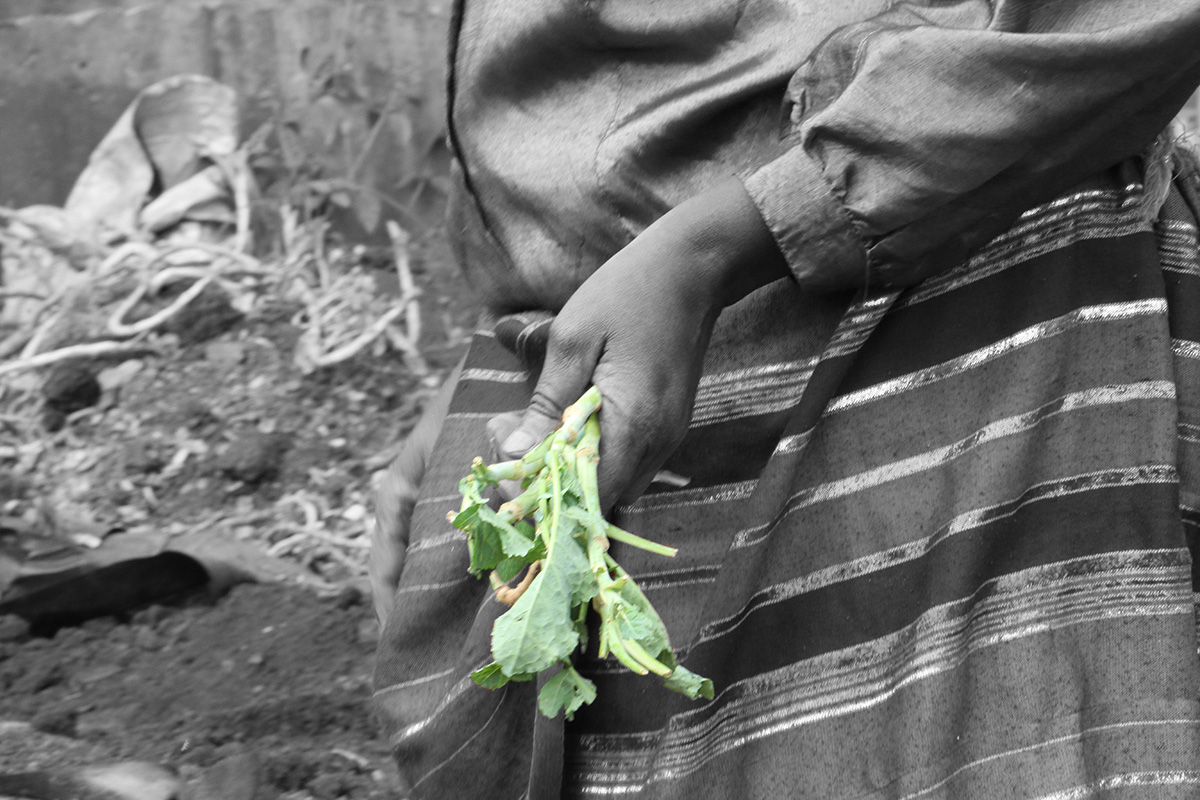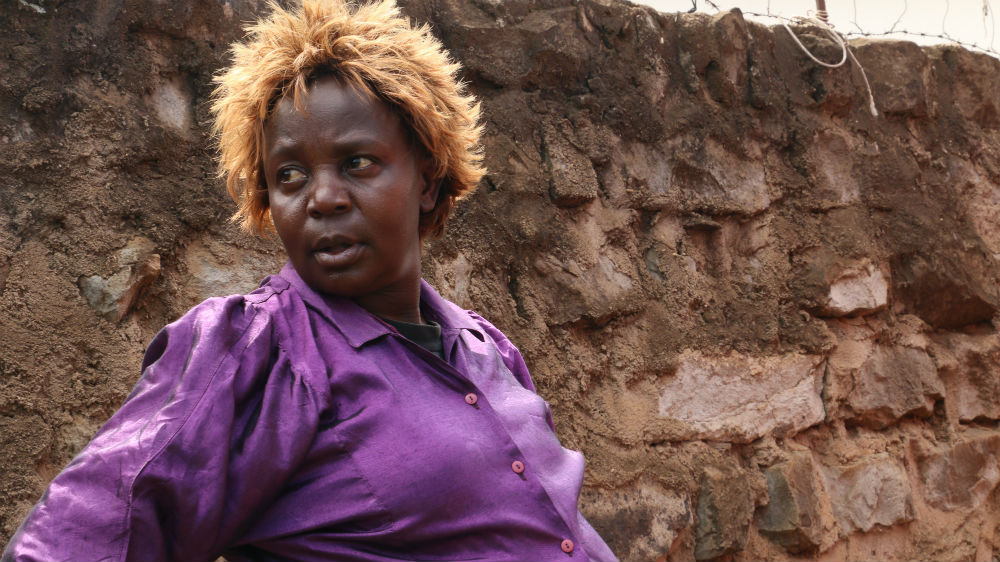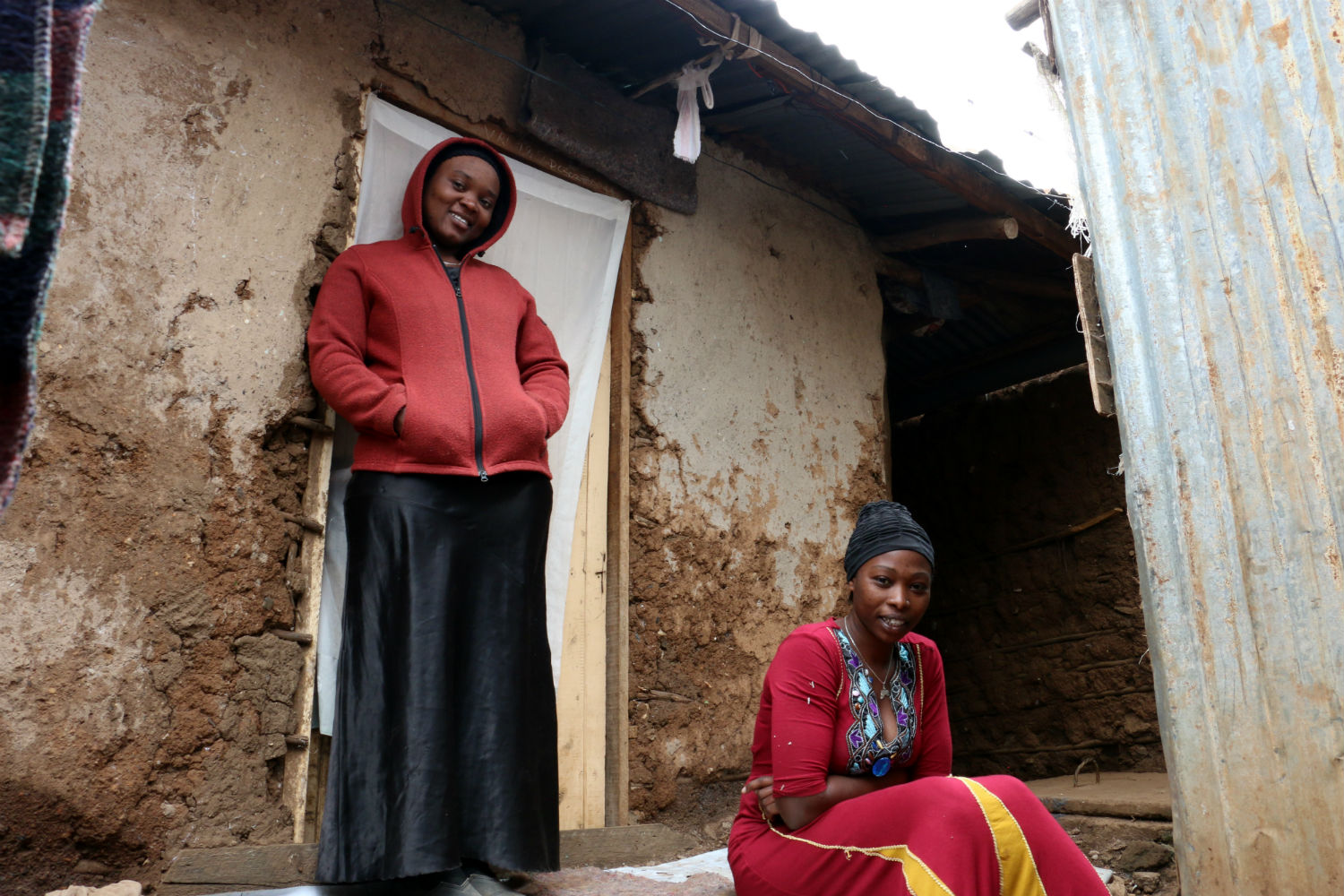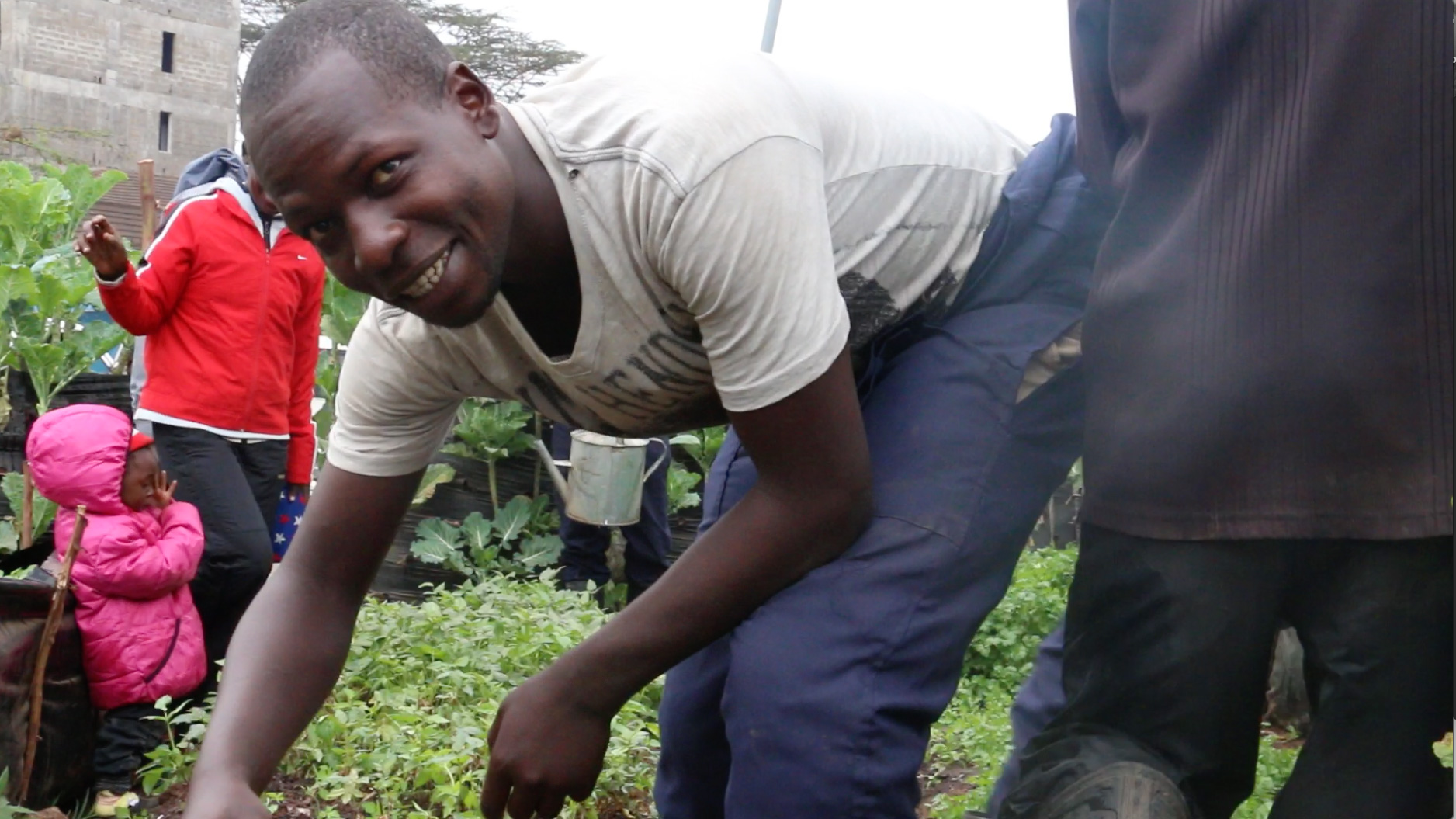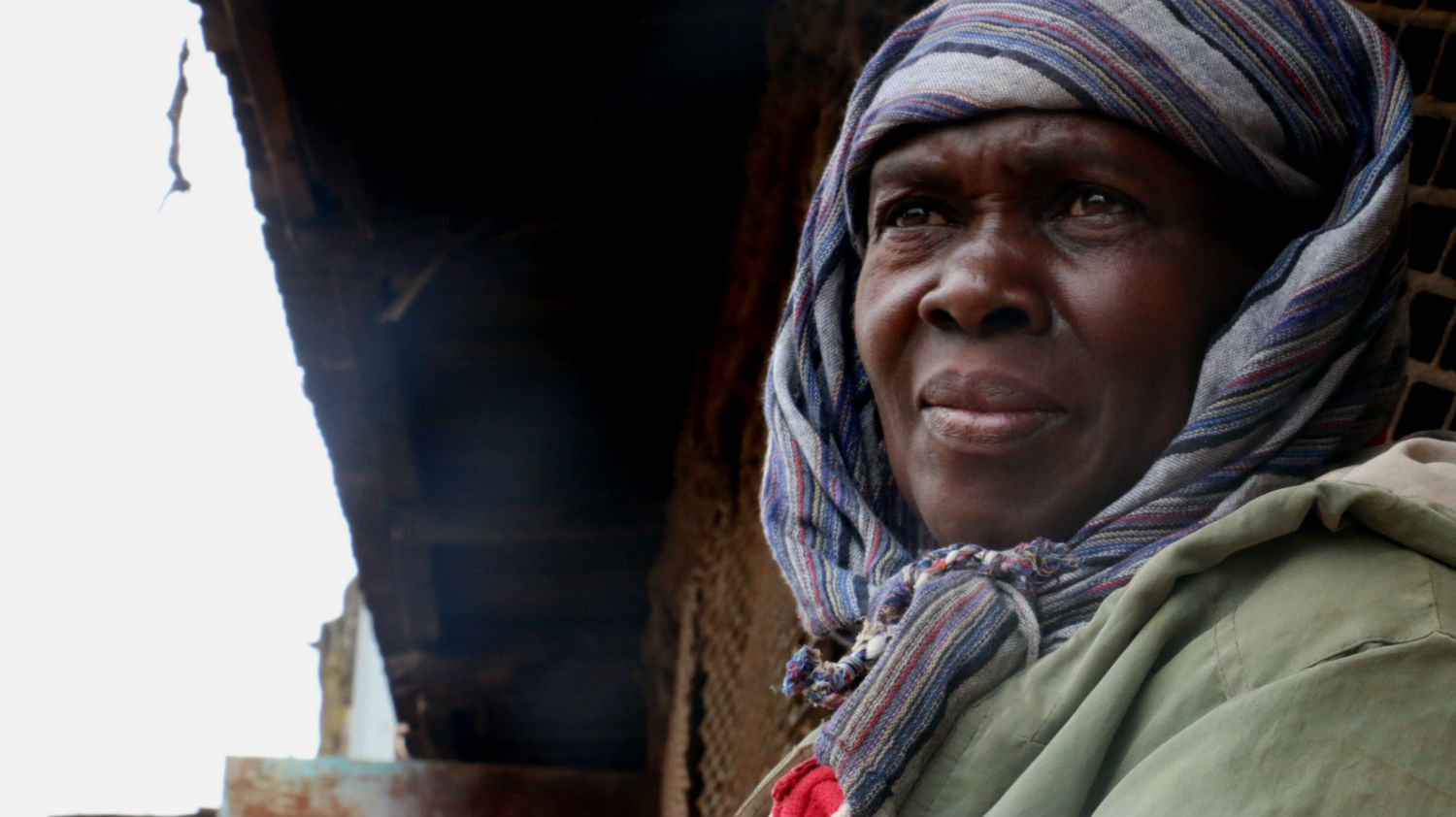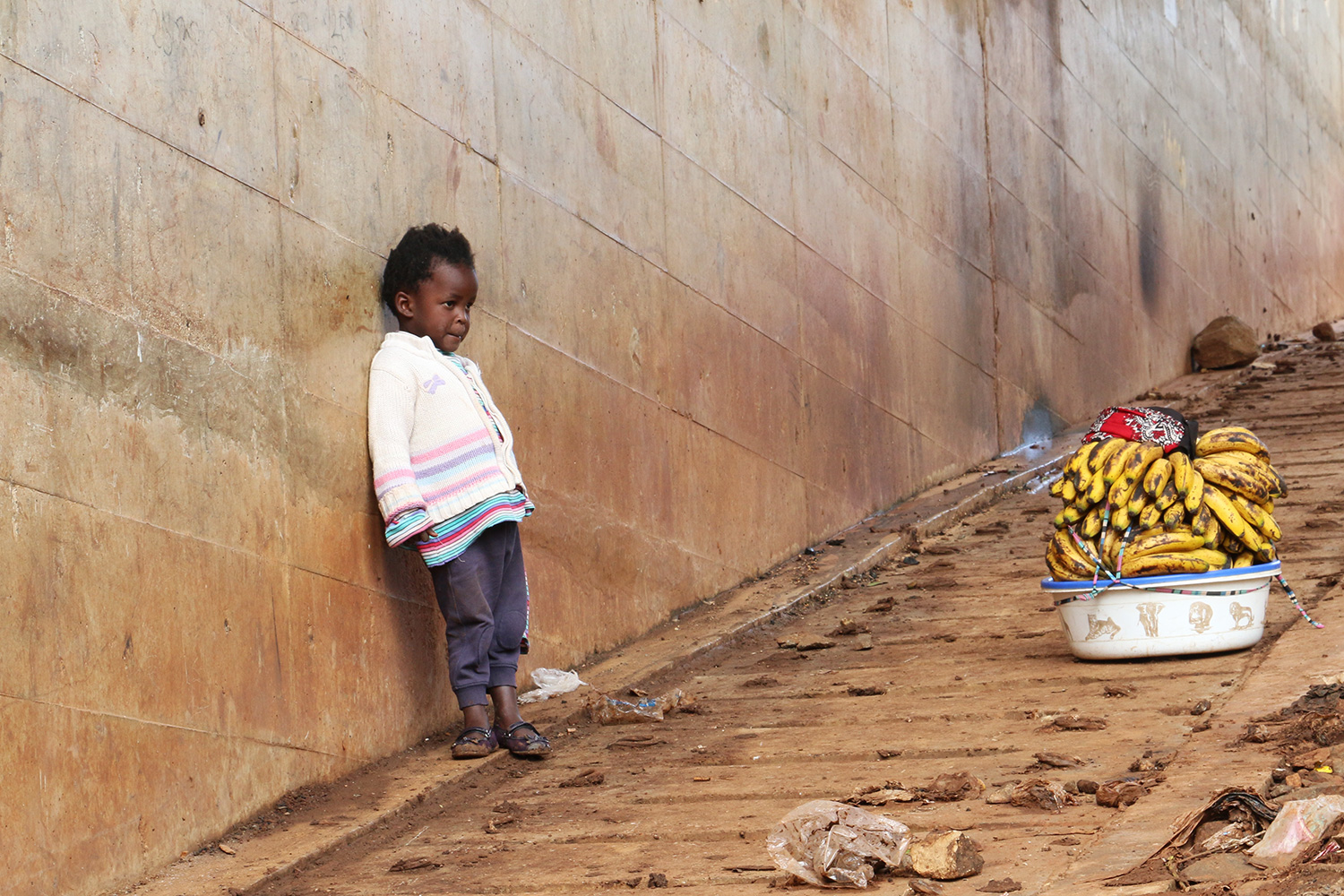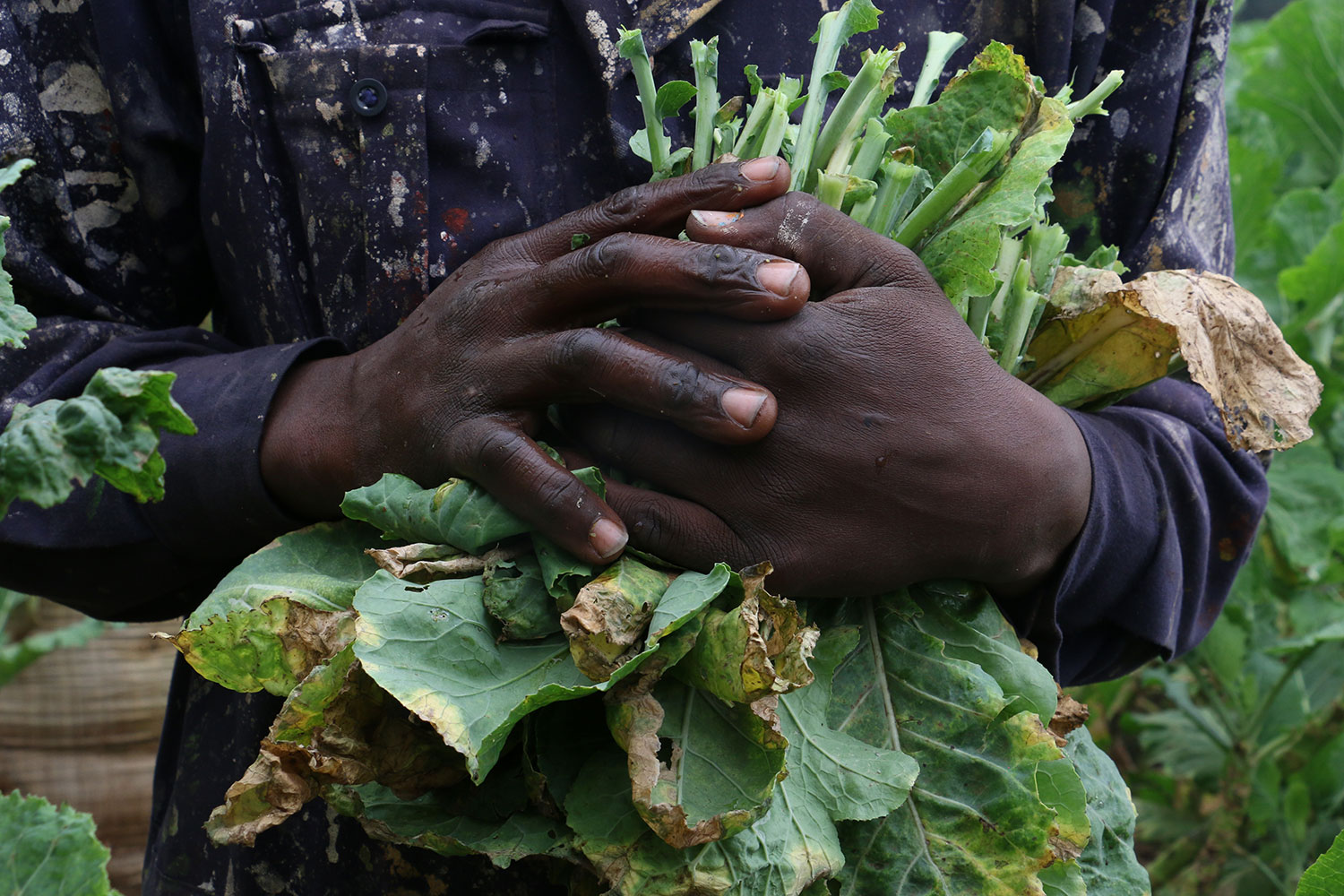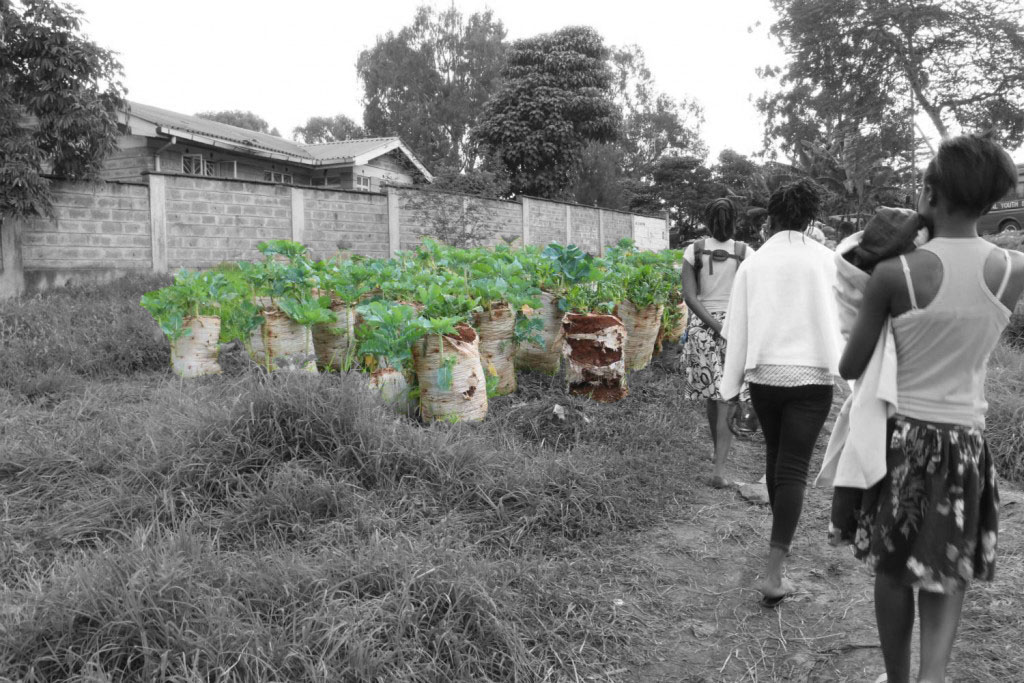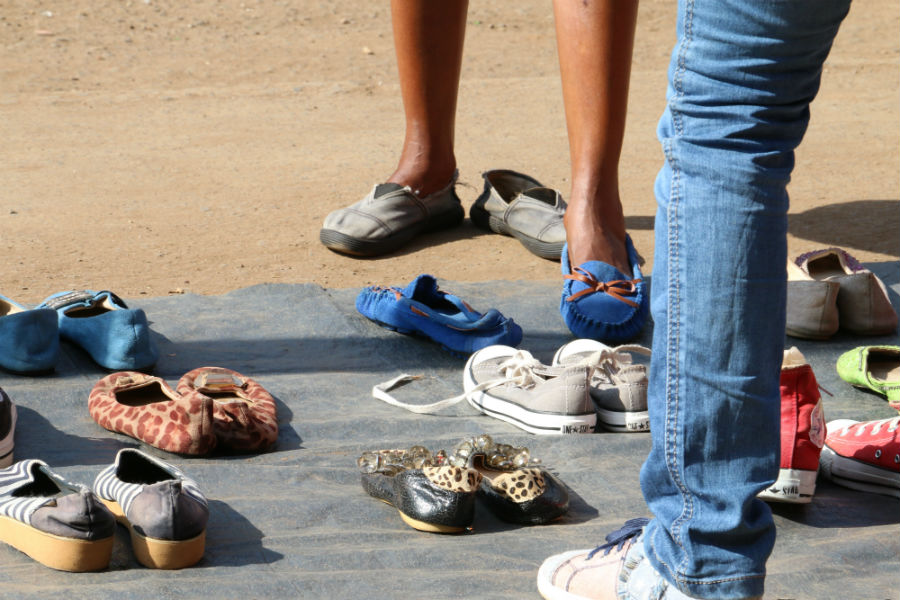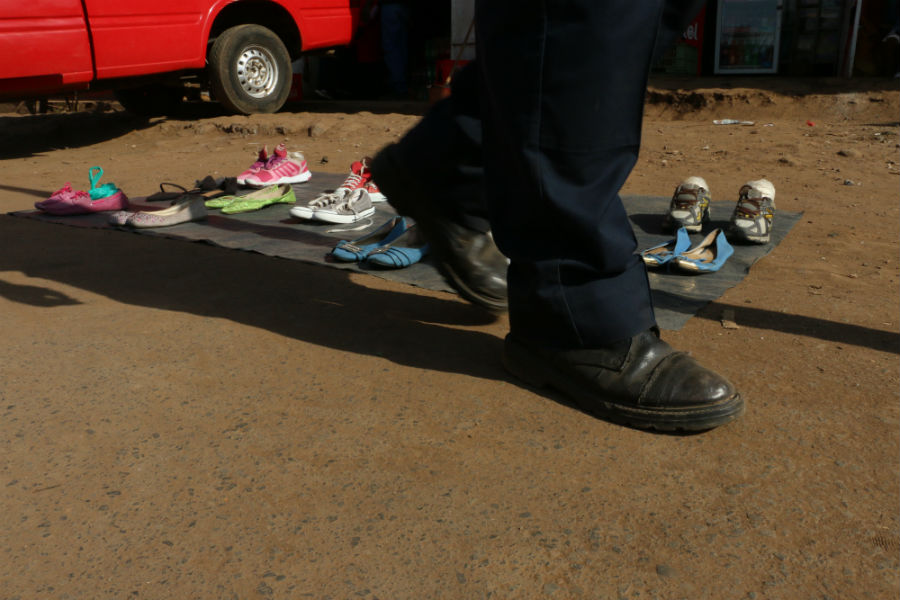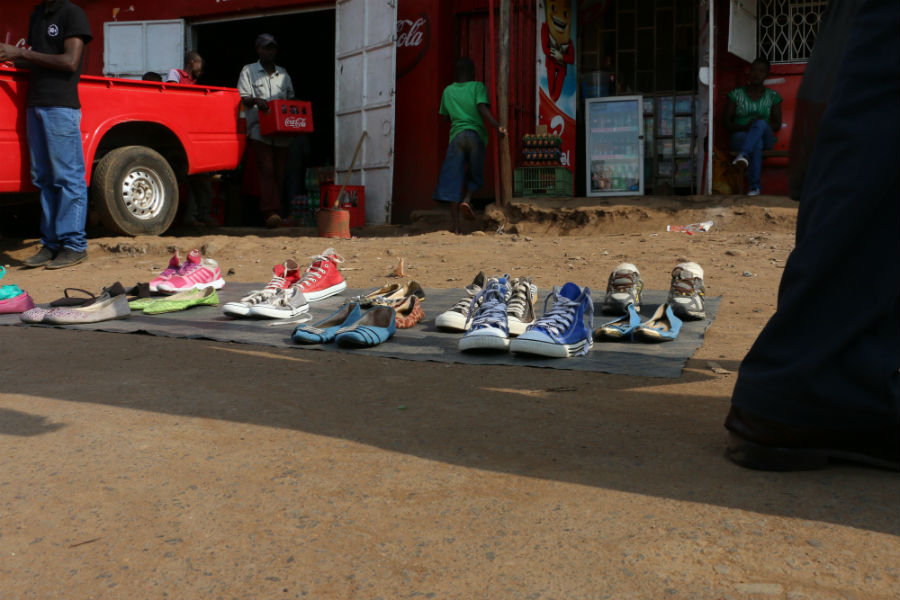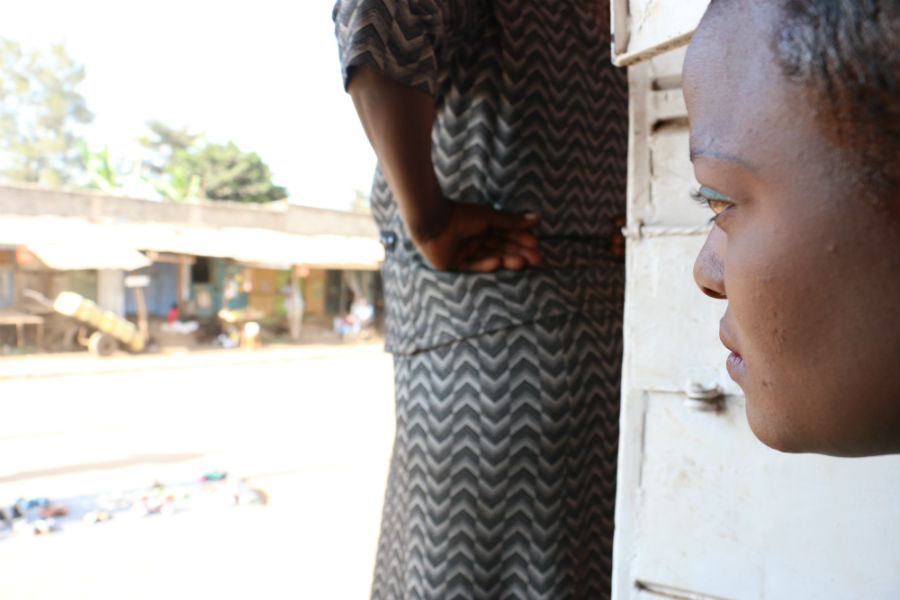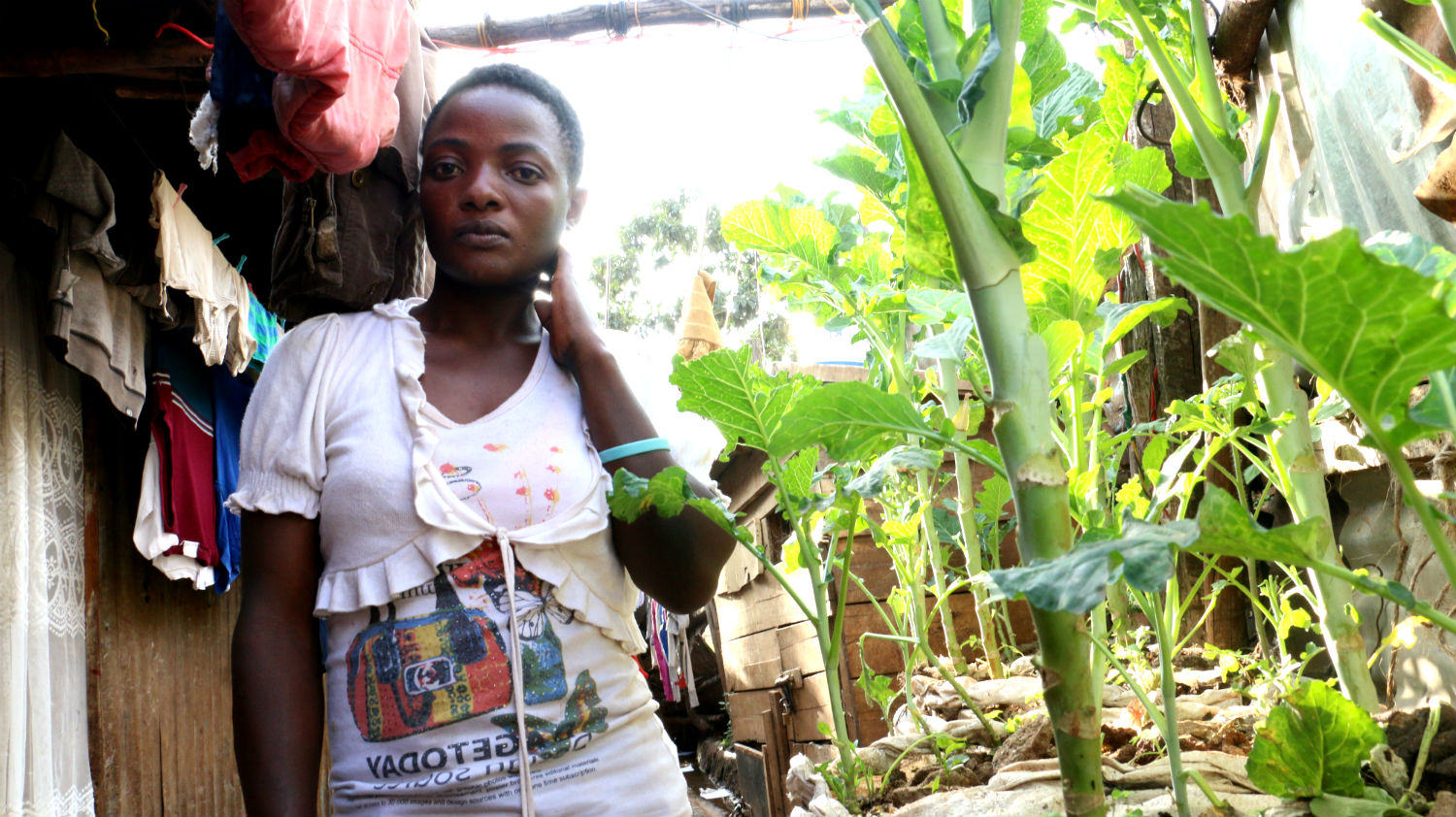
Judy: The single mom sack gardener
Judy Akengo is a 24-year-old single mother who lives in Kibera’s Soweto West village, located on the settlement’s most southwestern edge.
Judy is one of the estimated 5,000 urban farmers in Kibera — a number steadily increasing according to a 2013 study of urban agriculture in Kibera by researchers at the University of Nairobi, Northern Illinois University, Michigan State University and Johns Hopkins University.
Getting to Judy’s apartment and garden plot isn’t easy. After a five-minute trek off the main road, winding through the depths of Kibera’s back alleyways and over rivers of raw sewage, her tiny room is tucked into a tight complex of adjoined shacks.
I offer a Swahili hello, “Jambo, habari?” as I climb down the three stairs leading to her door.
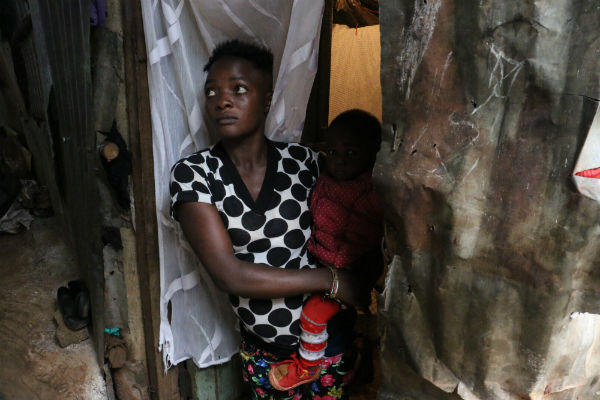
Judy and her daughter Natasha open their door to talk about urban farming and motherhood in Kibera. [Photo © Evelyn Harford]
Judy lives in a one room apartment with her two small children, 18-month-old Natasha, and nine-year-old Felix. Only a tattered lace curtain separates her sleeping area from the living space where her family of three cooks, eats and spends time together. As I squeezed into the 3-metre by 3-metre apartment it feels uncomfortably tight.
“Mzuri sana,” or “very good,” she replies.
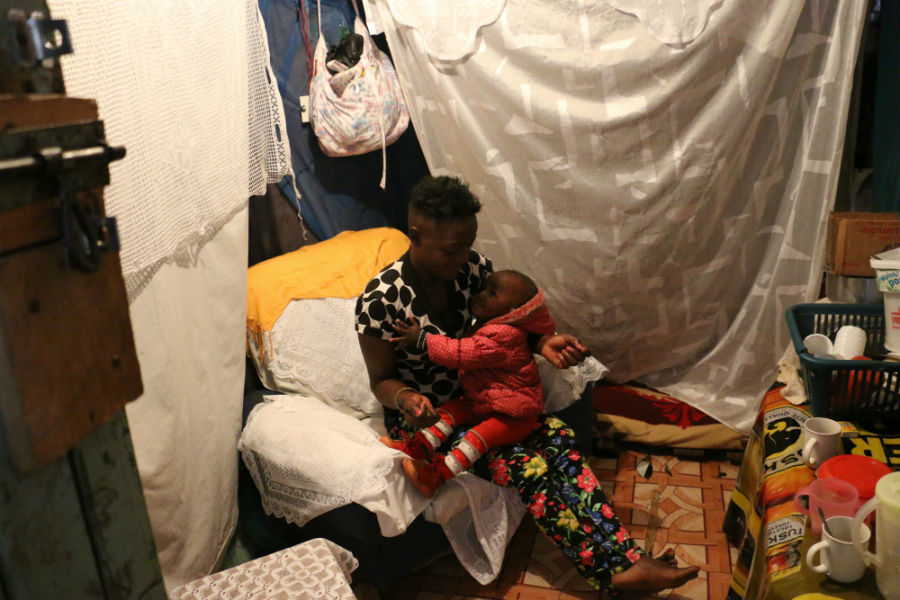
Judy’s daughter sits on her lap eating mandazi. [Photo © Evelyn Harford]
Judy begins to say something to me in Swahili with more complexity, thinking I might be able to carry on more of a conversation than I actually can.
“Pole,” I say, apologizing as I point to a small, clean-cut man in his mid-20s.
“This is my translator,” I say in English, “Aggrey Odhiambo.”
They shake hands and exchange some formalities and some things I can’t understand.
Clothes hang from a small line strung up between two corners in her living area. A pink lace bra balances on the middle of the line. Judy points at her lingerie and giggles under her embarrassed, shy breath. She outstretches her kind hands, offering me some mandazi, cardamom-infused fried bread and a cup of spiced milk tea, known as chai.

The tea and mandazi Judy prepared for me. [Photo © Evelyn Harford]
Her feminine beauty is breathtaking. A radiant glow seeps from her warm brown skin.
Judy’s eyes beam as she looks down at her daughter sipping tea from a mug she holds in her hand. We chat for a little as I sip my sweet, sugary cup of chai. Then she takes me to her garden.
Judy makes her living by farming kale in five sack gardens located a short walk from her house. She uses her side business as a used-shoe vendor to tell the community about her gardening and gain new clients.
Her garden is tucked away in an even tighter alcove behind her neighbour’s shack. Balance is key as we skip over wet rocks and duck under twisted rusted sheet metal to find the garden she’s been telling me about. Judy traverses these obstacles with ease and I struggle to keep up. She skips from stone to stone until I see green leaves peeking out behind the chaos.
The leafy kale grows from sacks nearly as tall as Judy’s five-foot frame.
Since Judy’s business is so small she only cuts the vegetables to order or else she would lose money. Customers looking for vegetables will approach her where she is selling shoes and Judy will fetch the kale from her home.
Her entrepreneurial spirit grew from necessity. Left as an unemployed teen mother with her first child at 15 she had no other choice.
Neither of her children’s fathers is around; she’s on her own.
Judy’s story is a common one. She came to Nairobi from her rural village in western Kenya to find a better life.
“At home, at the village, life was very difficult,” she says. “My father died, so it was my mother and her friend who found me a job housekeeping in Nairobi.”
It was in 2002 when Judy came to Nairobi to look for work as a housekeeper. She was pregnant a couple of years later with her first child and her employer fired her. Homeless and pregnant and with little money, she was forced to live in one of Nairobi’s informal settlements. So, as a teenager she came to Kibera.
As a single teen mother, she had no one to support her or her child. The cycle of poverty that Judy experienced as a child was repeating itself.
“I didn’t go to school at a young age,” says Judy. “My father passed when I was five-years -old. My mother didn’t have the capacity to take me to school, or to pay for my school fees.”
Things didn’t come easy. Prior to farming, Judy used to work as an attendant at a local brothel. As an attendant, you let men into the rooms and help to clean up after clients and the women who service the men.
Small, seedy brothels are scattered around Kibera’s many villages.

A Kibera brothel stands empty in the early morning hours. [Photo © Evelyn Harford]
Men come to have sex with women for as little as 20 cents CAD. Sometimes, they don’t even pay. The women, many of whom are hungry and addicted to drugs or alcohol, will have sex for a simple meal or a bottle of homemade liquor. Women who work as attendants at brothels often become prostitutes themselves. Judy wouldn’t say whether she had followed that path before leaving the brothel for sack farming.
While she struggled to make money to support her child, Judy became pregnant again by a different man. When she gave birth to her daughter she decided she needed to find a way to feed her family and make money to send them to school without the help of her baby’s father.
“The father of the kid disappeared and did not get it, so that’s why I decided to start farming,” she says, speaking through our translator.
Farming provides Judy with a job that makes her proud, unlike her work as an attendant at the brothels.
“People should recognize that I depend on urban farming,” says Judy. “So that they can stop discrimination, thinking that maybe I am using other means of survival, like sex work, to survive.”
Many women, like Judy, face discrimination from the community if they’ve worked in connection with the sex industry; indiscriminate sexual activity is still very taboo in Kenya.
Judy works hard to make ends meet but the hustle isn’t a choice; it’s a necessity. She wakes up at 6 a.m. every morning to head to a large market close to Nairobi’s city centre. She buys used shoes from the market then re-sells them along Kibera’s streets from 3 p.m. – 8 p.m. most nights. She tends to her kale between caring for her children and selling shoes.
Photo Gallery: Judy waits patiently to make a sale on her shoes. [Photo © Evelyn Harford]
“Life is not easy here,” says Judy. “Especially, with a business. Sometime the finances are very little, and the landlord needs the rent. The doors are being closed because you have not paid on time; it’s very difficult.”
But, her part in Kibera’s green revolution has helped Judy’s independence, self-confidence and finances.
“The entire process of urban farming has improved my life,” says Judy. “I depend on myself, not on a man to give me money for his daily use.”
Judy used to rely on men for money or security. Many women find themselves in relationships with men who will only “help them out” for the price of sex, usually without condoms. This is what happened to Judy.
Since she began farming four years ago, Judy has made nearly $150 CAD from farming alone. While this may not seem like a lot, for Judy this money has been transformative. The extra wages have helped to supplement her wages from shoe selling.
The daily wage in Kibera varies widely but the average income is $1.00 CAD. Judy wasn’t able to share with me how much she makes per year due to a lack of record keeping but it’s clear she is feeling less financial strain.
“I can feed my two kids, I can pay for the rent,” she says. “I am also able to pay for the school fees for my two kids.”
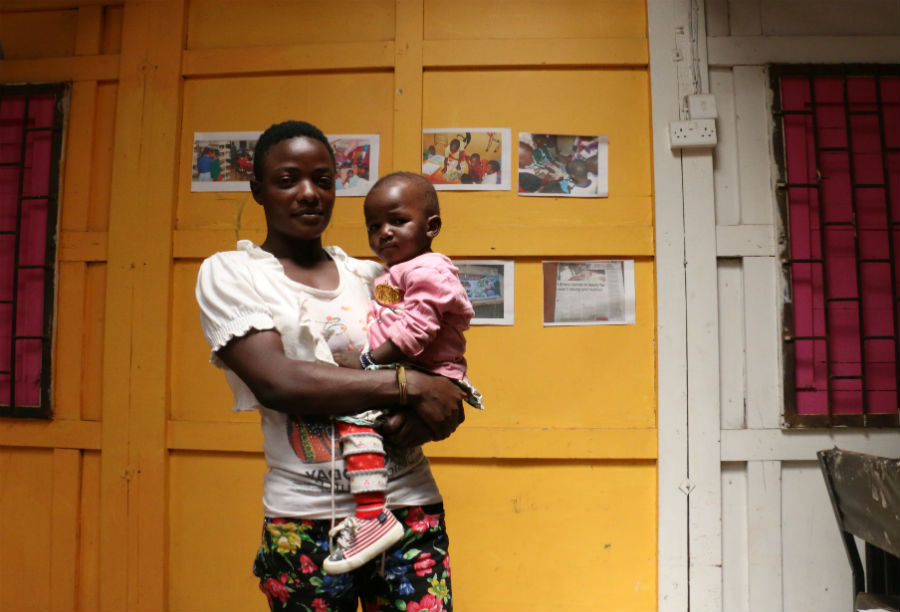
Judy and her daughter visit Savo Foundation to talk about her experience as a teen mother. [Photo © Evelyn Harford]
Judy also is able to provide for her children with the little extra money she earns from her five sack gardens.
“The other times, when I was not farming, I would go to find a job and I would come back home because I could not get a job. My kids would not go to school because of lack of money,” she says. “Since I have been taught how to farm, I have been able to get small money every day.”
Judy was taught by a neighbour and started with the initial investment of about $30 CAD to get the soil, water and sacks.
“Now that my business has expanded, I sell a lot of vegetables,” says Judy. “The capacity is not good now, but if I can expand further, through urban farming, my kids will be able to get the education they deserve in the future”, she says.
Space for sack gardening is still a major limitation for growth within Kibera. Many women, like Judy, dream that they could return to rural Kenya to plant larger plots and gain more profits.
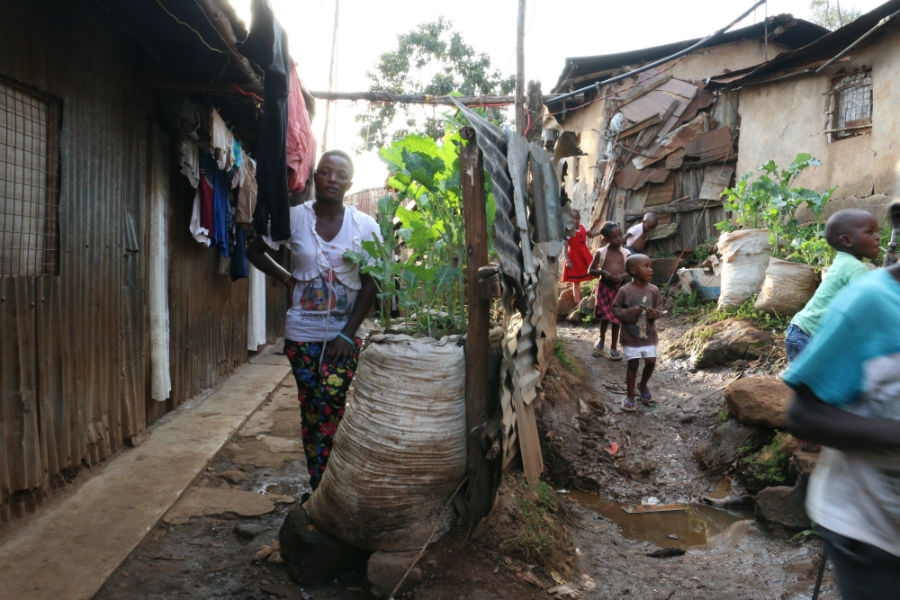
Judy says sack gardening has changed her life. She dreams of a bigger plot. [Photo © Evelyn Harford]
Unless the government carves out land for women like Judy to farm, or in the unlikely event that she saves enough money to purchase a rural plot, Judy will continue to be constrained by space and the small number of sacks she was able to construct. Her activities will help contribute to her family’s food security and her empowerment as a single woman.
Click on an image below to discover the next story.
